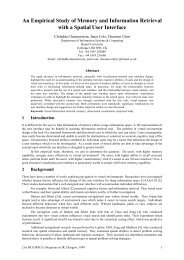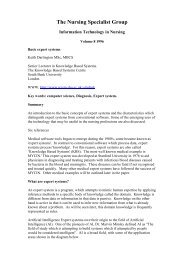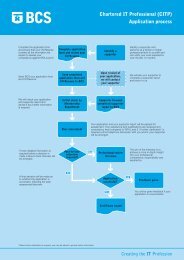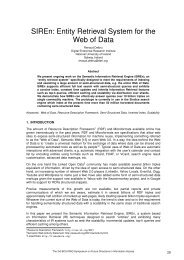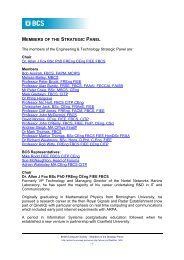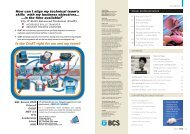DIGITAL DICTATION Reporting on the benefits of digital ... - BCS
DIGITAL DICTATION Reporting on the benefits of digital ... - BCS
DIGITAL DICTATION Reporting on the benefits of digital ... - BCS
You also want an ePaper? Increase the reach of your titles
YUMPU automatically turns print PDFs into web optimized ePapers that Google loves.
A NEW<br />
ERA<br />
The <strong>BCS</strong> Health Nor<strong>the</strong>rn Specialist Group was given an insight into how <strong>the</strong> use <strong>of</strong> clinical informatics is<br />
being encouraged across <strong>the</strong> North West by <strong>the</strong> new Health Informatics Clinical Advisory Team (HICAT) at<br />
NHS North West. Dr Andrew Coley, Chief Clinical Officer (CCO) for Health Informatics in NHS North West,<br />
and three <strong>of</strong> <strong>the</strong> five members <strong>of</strong> his team – Dr Asad Sadiq, Mr Bibhas Roy and Dr Amir Hannan –<br />
presented <strong>the</strong>ir new approach at a meeting in Manchester in July <strong>of</strong> this year. Phil Paters<strong>on</strong> reports.<br />
Dr Andrew Coley, a Senior Clinical Adviser<br />
to NHS North West and a practising GP,<br />
reminded <strong>the</strong> audience that between 2003<br />
and 2006 <strong>the</strong>re were various nati<strong>on</strong>al<br />
health informatics initiatives, but <strong>the</strong>re was<br />
always a mismatch between IT<br />
products/developments and <strong>the</strong> style in<br />
which <strong>the</strong>y were <strong>of</strong>fered to clinicians and<br />
what clinicians really wanted.<br />
Historically, IT project failures are usually<br />
more <strong>of</strong> a behavioural change problem<br />
than an IT problem. In health informatics<br />
<strong>the</strong> big problem is that clinical change<br />
management has always been missing.<br />
The introducti<strong>on</strong> <strong>of</strong> health informatics to<br />
clinicians needs behavioural management<br />
16 HINOW Autumn 2010<br />
for transformati<strong>on</strong>al change.<br />
The aim <strong>of</strong> <strong>the</strong> HICAT is to provide ‘world<br />
class health informatics with clinical<br />
leadership’ and ‘delivering improvement<br />
through clinical engagement’. The team’s<br />
approach is based <strong>on</strong> seven key beliefs:<br />
1. Genuine engagement occurs most<br />
effectively following debate at a local<br />
level.<br />
2. One must place <strong>the</strong> patient at <strong>the</strong> centre<br />
<strong>of</strong> a cultural move towards a new care<br />
pathway.<br />
3. Changes must be evidence-based.<br />
4. Local clinical leaders are essential –<br />
<strong>the</strong>y are likely to be respected and seen<br />
as h<strong>on</strong>est brokers by colleagues.<br />
5. Local evidence is <strong>of</strong>ten more compelling<br />
than ‘remote’ nati<strong>on</strong>al evidence.<br />
6. Success means aligning roles and<br />
resp<strong>on</strong>sibilities between clinical leaders<br />
and managers.<br />
7. Requesting a clinician to change<br />
working processes will produce<br />
diss<strong>on</strong>ance, leading to disengagement,<br />
or, if <strong>the</strong> product is good, engagement –<br />
<strong>the</strong> latter being <strong>the</strong> aim.<br />
In order to achieve impact with clinicians<br />
across <strong>the</strong> North West Dr Coley appointed a<br />
multi-disciplinary team <strong>of</strong> five clinical leads<br />
to work with him, <strong>on</strong>e each for diagnostics,



